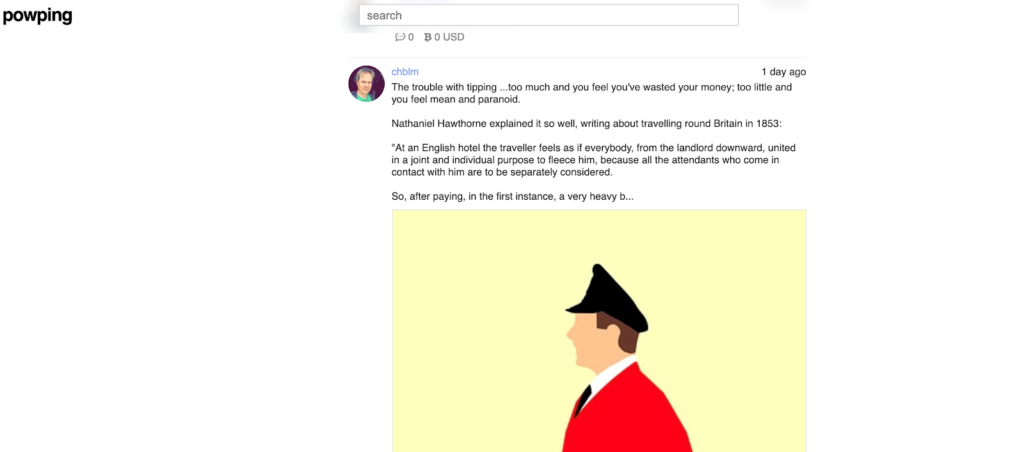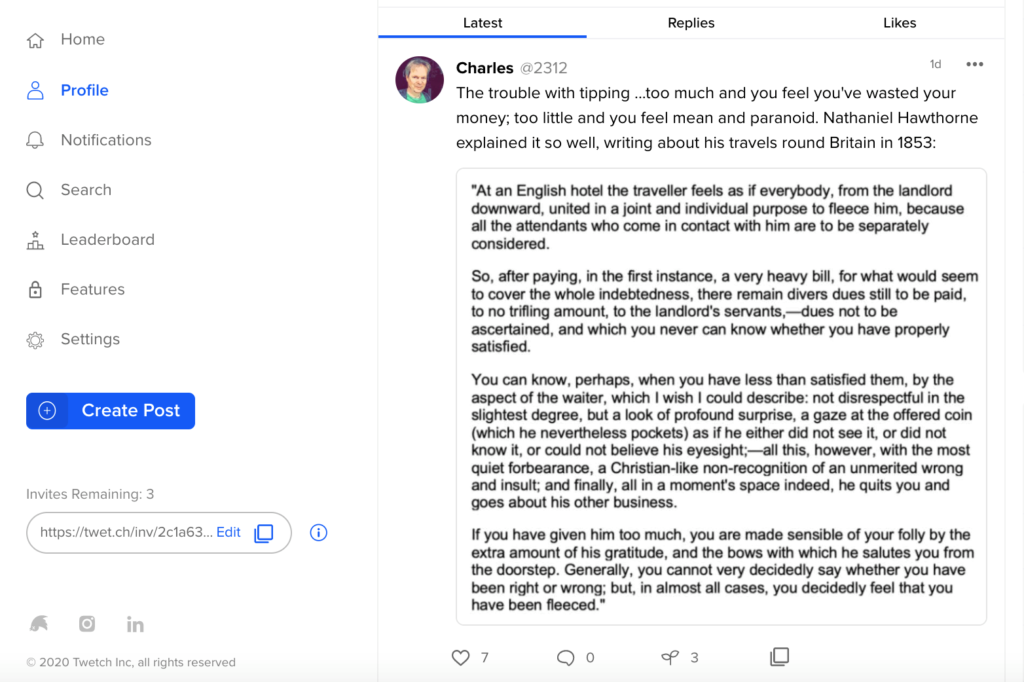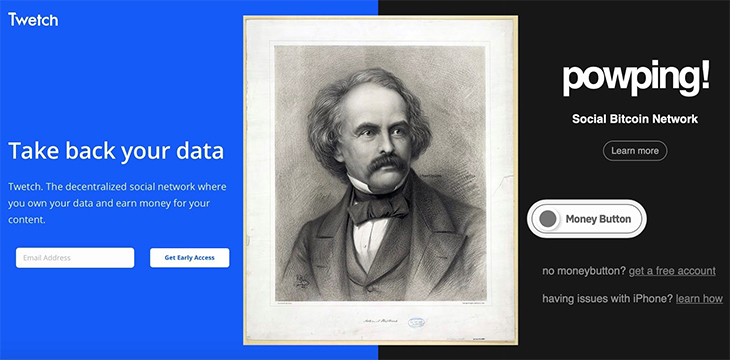|
Getting your Trinity Audio player ready...
|
Rival business models are exploring microtransactions for consumer apps on Bitcoin SV as replacements for ‘surveillance capitalism.’ Bit.sv, Streamanity, Twetch and now PowPing are testing their users’ willingness to pay for content, and their appetite to be paid for creating it.
Twetch and PowPing use alternative business models for Twitter-like social media. On Twetch, you have to pay to post and are rewarded when someone engages with your content. On PowPing, you post for free and users are invited to tip when they see something they like. In both cases, content-posters act like micro-workers in the gig economy, rewarded in proportion to how much work they do and how well it’s received.
To perform my own little experiment I posted (almost) the same post on Twetch, PowPing and Twitter. It was a quotation from the 19th Century American writer Nathaniel Hawthorne (above) about tipping.
Here are the results, an hour after posting on all three apps:
Twitter (with 1471 followers):
829 impressions; 13 likes; 5 retweets. One comment.
Twetch (with 31 followers):
9 engagements (6 likes, 3 branches); $0.27 earned; cost to post $0.08.
PowPing (with 63 followers):
$0.08 in tips (from two people). One comment.
This is not a fair comparison. PowPing has only been around for about a week, Twetch for just over a year and Twitter for 14 years—so they have vastly different numbers of users.
There are other reasons why this isn’t a controlled experiment. For instance, on PowPing, my post didn’t breach any character limit, although only the first part was shown in the feed. You have to click on the text to reveal the rest (did everyone know that?):

On Twetch and Twitter, the character limit meant I had to put some of the text into a jpeg:

Perhaps a better comparison than engagement would be engagement per follower. One in 81 of my Twitter followers engaged with the post; one in 32 of my PowPing followers; and an impressive one in 3 of my Twetch followers. But if Twetchers are feeling a little defensive about new competition from PowPing, then a post that appeared to diss tipping might have appealed to them disproportionately.
But back to business models. As a content creator, would I rather be paid per response (Twetch) or tipped by benevolent customers (PowPing)? Well, almost certainly the former. Why rely on the kindness of strangers if you can be paid a fixed rate—albeit not for your output, but for people’s response to it? (And after all, that’s pretty much how authors, movie producers and rock bands get rewarded.)
But content producers don’t get to choose what business models are viable. Customers may prefer to decide who to pay (PowPing), and how much, than have their rate of payment decided for them (Twetch).
The quotation I used in my post was about the awkwardness of tipping—that you never know whether you have given too much or too little. But Hawthorne went on to explain that there was often no alternative to tipping in the 1850s, because hotels and stage coach businesses expected their workers to serve or drive without receiving any remuneration:
No wages are paid by the host to those servants—chambermaid, waiter, and boots—who come into immediate contact with travellers. The drivers of the cars, phaetons, and flys are likewise unpaid, except by their passengers.
PowPing users may get used to the idea of tipping, as Hawthorne explained that he and his fellow travellers had: “When you come to understand this claim, not as an appeal to your generosity, but as an actual and necessary part of the cost of the journey, it is yielded to with a more comfortable feeling.”
I thought this would be an analogy for the future success of PowPing: that its users would come to understand that tipping was part of the way it was designed to work. But that doesn’t seem to be the plan. PowPing’s creator, Unwriter, commented on my post (and tipped me for it—thank you!). Here’s what he had to say:
I think the word “tip” is what confuses some people about PowPing. It’s actually not a “tip”, it’s a different social dynamic if you look closely. In fact, the only reason I chose the term “tip” was because it’s familiar with most people in bitcoin. This term will change in the future since it’s a different phenomenon that’s happening here.
For starters, a lot of so called “tips” on PowPing happen in the opposite direction of what other “crypto social media” sites do. It’s not about making money with content, it’s not about paying to upvote something. People here just post whatever they want, and the real value happens in the interaction (in the comments section). You’ll see this happen very often here if you look around. A lot of times the author doesn’t receive any “tip” for his/her post, but people in the comment section “tip” each other. Or the author tips the commenters for sharing thoughts.
It’s all about facilitating casual interaction. Value arises naturally. And there are many ways to capture it. This is just the beginning.
Does that throw a different light on PowPing tipping? I’m not sure. Certainly PowPing has an advantage over Twetch in not disincentivizing people for posting by charging them. But if it is, as Unwriter says, “all about facilitating casual interaction” then can you ever beat the Twitter or Facebook model, where, as the psychologist B.J.Fogg says, the ‘like’ button is the simplest form of mutual recognition ever invented—a tiny pat on the back to a friend if you like their photograph or a one-click political statement in support of a campaign.
Both Twetch and PowPing –and other BSV enterprises—share an assumption that there is a payment level below which users will simply not worry about spending money: nobody will care about spending $0.01.
My own hunch is that there is still marginal friction in agreeing to spend even $0.01. But I believe these business models can work at scale, whether based on tipping or fixed payments, once people realise that micropayments are—literally—a small price to pay for escaping the clutches of surveillance capitalism. The prospect of no ads, together with the more abstract notion of owning your own data, are the crucial ideas that BSV content-hosting sites need to get across.

 02-18-2026
02-18-2026 




